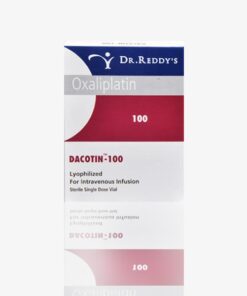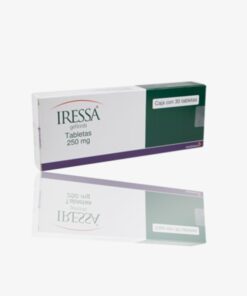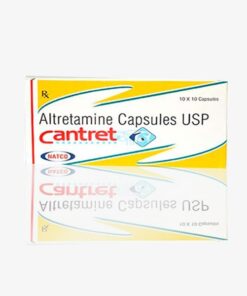Buy Soranib : Sorafenib 200 Mg Tablets 120’S Online For Sale
$81.48
Brand Name : Soranib
Composition : Sorafenib Tosylate
Manufactured by : Cipla Ltd.
Strength : 200 mg
Form : Tablets
Packing : Pack of 120 Tablets
Prescription Required *
Soranib is a medication used to treat kidney, liver, and thyroid cancer. It contains the active ingredient Sorafenib Tosylate, which is a type of targeted therapy that blocks the action of enzymes that stimulate the growth and spread of cancer cells.
Uses:
Soranib is used to treat:
– Advanced renal cell carcinoma (kidney cancer)
– Advanced hepatocellular carcinoma (liver cancer)
– Differentiated thyroid carcinoma (thyroid cancer)
HOW TO USE:
Soranib tablets should be taken orally, with or without food. The recommended dose is usually 400mg twice daily (800mg/day). The tablets should be swallowed whole with a glass of water. The dosage may vary based on the patient’s medical condition, response to treatment, and other factors. It is recommended to take Soranib at the same time each day.
Storage Conditions:
Soranib should be stored in a cool, dry place below 25°C (77°F). Keep it away from direct sunlight, heat, and moisture. Ensure that the medication is kept out of reach of children and pets.
Mechanism of action:
Soranib works by blocking the action of enzymes and proteins that stimulate the growth and spread of cancer cells. It targets the activity of several receptors, including vascular endothelial growth factor receptor (VEGFR), platelet-derived growth factor receptor (PDGFR), and Raf kinase, which helps to slow down the growth of cancer cells.
Precautions:
– Soranib may increase the risk of bleeding, so patients should avoid taking aspirin or other blood-thinning medications unless recommended by their doctor.
– Soranib may cause liver problems, so regular liver function tests are required while on prolonged therapy.
– Patients may experience hypertension, so regular blood pressure monitoring is required while on therapy.
– Soranib may cause skin reactions that may range from mild to severe. Patients should inform their doctor if they develop any skin reactions.
– Soranib may cause fatigue, dizziness, or confusion, so patients should avoid engaging in activities that require alertness and concentration.
Contraindications:
Soranib is contraindicated for patients who:
– Are allergic to Sorafenib Tosylate or any of its ingredients
– Have severe liver problems
– Have a history of bleeding disorders
Drug Interactions:
Soranib may interact with other medications and affect their effectiveness or increase the risk of side effects. Patients should inform their doctor if they are taking any prescription or over-the-counter medications, vitamins, or herbal supplements.
Overdose:
In the event of an overdose, patients should seek immediate medical attention. Symptoms of overdose may include dizziness, confusion, diarrhea, skin rash, and liver problems.
Side Effects:
Soranib may cause side effects, which may vary from mild to severe. Common side effects include:
– Fatigue
– Weakness
– Loss of appetite
– Nausea and vomiting
– Diarrhea
– Skin rash
– Hand-foot syndrome (redness, swelling, and pain in the palms and soles)
– Hypertension
– Bleeding
– Changes in liver function tests
Less common but serious side effects include:
– Heart problems
– Pulmonary embolism
– Hepatotoxicity (liver problems)
– Renal failure
Patients should inform their doctor immediately if they experience any serious or persistent side effects.
Be the first to review “Buy Soranib : Sorafenib 200 Mg Tablets 120’S Online For Sale” Cancel reply
Related products
Anti Cancer
Anti Cancer
Anti Cancer













Reviews
There are no reviews yet.